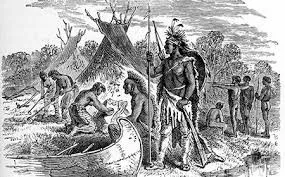The arrival of European colonizers in the Americas during the late 15th and early 16th centuries marked a significant turning point in the history of the Native American peoples. The impact of European colonization on these diverse societies was profound and multifaceted. This article delves into the far-reaching consequences of this encounter, examining how it affected Native American cultures, societies, and ways of life.

Disease and Demographic Catastrophe
One of the most devastating consequences of European colonization was the introduction of infectious diseases to which Native Americans had no immunity. Diseases like smallpox, measles, and influenza spread rapidly through Native communities, causing catastrophic epidemics. The loss of life was staggering, with some estimates suggesting that up to 90% of the Native American population may have perished due to these diseases. Entire villages and cultures were decimated, leading to the weakening and disappearance of many distinct societies.
Land Dispossession
The arrival of European colonizers brought about a fundamental shift in land ownership and land use. The concept of private land ownership, unfamiliar to many Native American tribes, was imposed upon them. Colonizers claimed vast territories, often through force or deceit, which resulted in the dispossession of Native lands. The loss of their ancestral lands not only disrupted the traditional Native American way of life, which was closely tied to the land, but also pushed many tribes to the brink of cultural and economic collapse.
Forced Relocation and Displacement
As European colonies expanded, Native American tribes were frequently forced to relocate. The policies of forced removal and displacement were particularly evident in the United States with events like the Trail of Tears, where the Cherokee Nation was compelled to relocate from the southeastern US to Indian Domain (presently Oklahoma). These forced relocations disrupted social structures, traditional economies, and led to the loss of sacred lands.
Economic Exploitation and Dependency
European colonizers often exploited the natural resources of Native American lands, including furs, timber, and minerals. Native Americans were sometimes coerced into trading with European settlers, which resulted in economic dependency. The fur trade, for example, significantly altered Native American hunting practices and traditional economies. Native Americans found themselves caught between preserving their way of life and adapting to the demands of the emerging market economy.
Cultural Erosion and Acculturation
The interactions between Native American tribes and European settlers resulted in a blending of cultures. Native Americans adopted some aspects of European culture, such as new technologies and crops, while European settlers sometimes adopted elements of Native American culture. However, this process of cultural exchange was often asymmetrical, with Native American cultures being more vulnerable to erosion. Native languages, spiritual practices, and traditions were often suppressed, leading to the loss of cultural heritage and identity.
Warfare and Conflict
The influx of European settlers often led to conflicts with Native American tribes over land and resources. These conflicts, often referred to as “Indian Wars,” resulted in significant loss of life on both sides. Many Native American tribes were pushed to the brink of extinction through a combination of warfare, disease, and economic deprivation. The Battle of Little Bighorn, the Wounded Knee Massacre, and the many conflicts with European colonial powers illustrate the tragic history of armed conflict.
Loss of Sovereignty
As European colonial powers and, later, the United States expanded, Native American tribes lost their political sovereignty. They were subjected to treaties and policies that restricted their autonomy and self-governance. The U.S. government’s policy of assimilation, as exemplified by the Indian Removal Act and the Dawes Act, aimed to “civilize” Native Americans by erasing their traditional cultures and lifestyles.
The impact of European colonization on Native American societies was a complex, often tragic, and far-reaching process that reshaped the course of history for both Native Americans and Europeans. While it is essential to acknowledge the numerous negative consequences, it is also important to recognize the resilience and enduring contributions of Native American cultures. Despite centuries of adversity, many Native American tribes have persevered and continue to maintain their unique traditions and identities in the face of the challenges posed by European colonization. The historical narrative reminds us of the importance of respecting the rights and dignity of Indigenous peoples and working towards reconciliation and equitable partnerships in the present and future.
